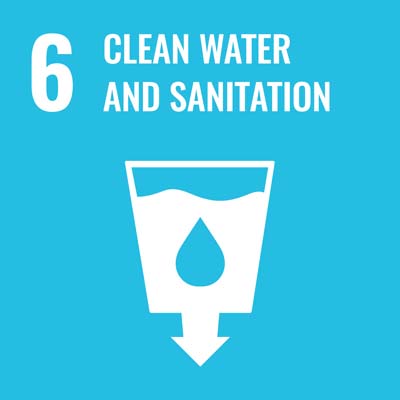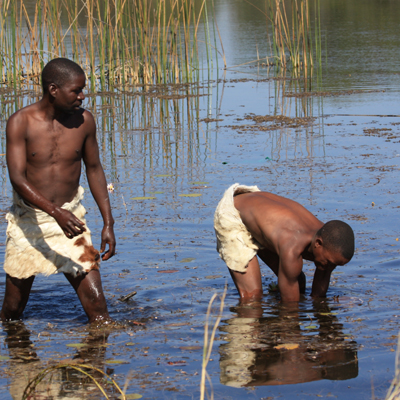The sixth Sustainable Development Goal is to ensure availability and sustainable management of water and sanitation for all.
2023 progress report
Our organisation, water conservation and infrastructure
The University monitors and tracks its consumption of water and waste and has set goals to reduce use by 2030.
As part of the major UKCRIC project, our sewage treatment works and pilot hall project work to improve wastewater treatment process to meet EU quality standards.
We follow Water Conservation and Efficiency Standards and Regulations in our new building projects. See the Water Management plans on our water management page.
Our Annual Environment Report (p12) outlines our campus-related plans for this Sustainable Development Goal.
Pollution monitoring and control is being implemented via the Cranfield Urban Observatory, with its campus-wide sensor network. As part of this, air, water, and soil sensors have been deployed across the Cranfield campus with the capability of monitoring a wide range of potential pollutants. Data is used both in teaching and learning and as a mechanism to monitor potential pollution on the Cranfield campus.
Education
Cranfield University is home to two centres of excellence in water education and research: Cranfield Water Science Institute and the Centre for Water, Environment and Development. The centres offer postgraduate taught and research degrees as well as short courses on campus or in-company.
The relevant courses offered are listed on this web page.
Cranfield is partner in two EPSRC Centres for Doctoral Training in water:
- Water and Waste Infrastructure and Services Engineered for Resilience (Water-WISER).
- Water Infrastructure and Resilience (WIRe).
Research
Highlights from our research, much of it international, in 2022/23 included:
- ULTIMATE aims to create economic value and increase sustainability by valorising resources within the water cycle. The project is focused around nine large-scale demonstration sites across Europe and the SE Mediterranean. Cranfield has partnered with Aquabio Ltd, a pioneer in industrial water recycling and wastewater-to-energy, to undertake work at their anaerobic MBR plant on the site of the world-famous Glenmorangie distillery in Scotland.
- Water Resources East – Cranfield is involved in a £5m flagship WRE project (funded by Anglian Water) to develop a long-term, multi-sector integrated water resource strategy for the East Anglian region.
- Rapid monitoring of water quality in LMICs (low middle income countries) with low-cost biosensors.
- Building the resilience of high value agriculture to climate and drought – working with the Institute of Natural Resources (INR) in South Africa and with commercial farm businesses in the Groot Letaba catchment.
- Harnessing Pesticide Degrading Bacteria for Enhanced Drinking Water Treatment.
- Prevalence of Viruses and Somatic Coliphage in UK Waters – Method Development and Data Gathering.
- Methane Removal from Water – Bluemethane is a project focused on optimising technology to capture methane from water and create a new source of bioenergy.
- Scaling Up Off-Grid Sanitation – this research will focus on an emerging off-grid sanitation option in the form of container-based sanitation (CBS) across four city contexts where the provision and regulation of CBS is done by different organisations. In Cap Haitien (Haiti), CBS is provided by an NGO, in Lima (Peru) it is provided by a private company, in Cape Town (South Africa) it is provided by the municipality and in Kakuma Refugee camp (Kenya) it is provided by a private company working with an NGO.
- Nature based solutions for the removal of emerging micropollutants.
Supporting local communities
SAFAD (Silsoe Aid for Appropriate Development) is a charity run by Cranfield students. Since 1969, SAFAD has sent over 340 graduate and post-graduate volunteers to almost 40 different countries in the developing world. Several new research projects were begun in 2022/23.
The Sue White Fund works alongside SAFAD. The recent Sue White Fund conference provided an update on many water-related projects (secure drinking water, minimising pollution from agriculture, precision irrigation, wastewater reclamation).
Cranfield University is also a founding member of WSUP (water and sanitation for urban poor). As part of World Water Week 2022, WSUP and Cranfield developed a new, fun and engaging online game, The Water Balance Challenge, a provocative instrument to help people consider their choices and risks when in charge of water distribution in an urban environment.
Developing ground water training course across several nations –many countries, especially in sub-Saharan Africa, are described as being in economic water scarcity, for lack of sufficient investment in water resource development. In many cases, groundwater resources are present, but funding to tap this water is insufficient. Developing groundwater through the construction of high-quality wells and boreholes is consequently very important to the water security of nations. It is also very important in humanitarian response, especially given the long-term nature of many humanitarian crises.
During October 2022, 15 participants attended the course, ranging from organisations such as Medecins sans Frontiers, Help - Hilfe zur Selbsthilfe, Container Based Sanitation Alliance and working in countries such as Zambia, Uganda, Mali and South Sudan.
Outreach
Hampshire & Isle of Wight Wildlife Trust online talks –Cranfield academics gave two talks to this local group: the first on why water recycling could be crucial for tackling the UK's predicted future water shortages, and how public perception could affect its implementation. The speaker was Dr Heather Smith from Cranfield University. The second talk explored how water supply and demand will change in the future, and what actions are needed to balance the two. The speaker was Professor Tim Hess from Cranfield University.
Working with local governments
In 2022, we began a collaboration with the African Ministers' Council on Water (AMCOW) for policy recommendations and guidelines on cross-sectoral measures for integrated water resources across schistosomiasis endemic regions. The project shares best practice with members and develops educational resources.
2022 progress report
Our organisation, water conservation and infrastructure
The University monitors and tracks its consumption of water and waste and has set goals to reduce use by 2030.
As part of the major UKCRIC project improving the resilience of infrastructure and cities, our sewage treatment and pilot hall facilities work to improve waste water treatment processes to meet EU quality standards.
We have policies on pollution, follow water conservation and efficiency standards and regulations in our new building projects.
Our Annual Environment Report outlines our water conscious planting programme, including a sustainability garden (see p18). This area has been set aside to showcase and develop sustainable gardening practices and targets for more water conscious planting (p11).
Education
The Water Theme at Cranfield University is home to two centres of excellence in education and research: Cranfield Water Science Institute and the Centre for Water, Environment and Development. The Centres offer postgraduate taught and research degrees as well as short courses on campus or in-company. The courses offered are listed on this web page.
Research
Our international research on water in 2021/22 included:
- Cranfield is part of NextGen Water. The project aims to contribute to a future European roadmap for water in the circular economy.
- Commentary on drought.
- Working with the water utilities, Cranfield looked at surface flow treatment wetlands for sustainable phosphorus removal and delivery of co-benefits.
One of our REF 2021 case studies focused on changing how risk is managed for safer drinking water.
Supporting local communities
SAFAD (Silsoe Aid for Appropriate Development) is a charity run by Cranfield students. Since 1969, SAFAD has sent over 340 graduate and postgraduate volunteers to almost 40 different countries in the developing world. Several new research projects were begun in 2021/22.
The Sue White Fund works alongside SAFAD. The recent Sue White Fund conference provided an update on many water-related projects (secure drinking water, minimising pollution from agriculture, precision irrigation, wastewater reclamation).
Cranfield University is also a founding member of WSUP (Water and Sanitation for Urban Poor). As part of World Water Week 2022, WSUP and Cranfield developed a new fun and engaging online game, the Water Balance Challenge, a provocative instrument to help people consider their choices and risks when in charge of water distribution in an urban environment.
We are tackling the challenges of water, sanitation and hygiene (WASH) in rural communities in a rapidly changing global climate. This work is ongoing and led by Cranfield’s Alison Parker.
We are members of Water Resources East and have contributed towards their analysis of regional water security.
Community and outreach
A Cranfield garden at the RHS Chelsea Flower Show promoted the sustainable use of water, encouraging the UK’s 30 million gardeners to save water. This project was shortlisted for a Changing the World award in October 2022.
On campus we provide free drinking water. All students are given a discounted water bottle upon arrival. We are expanding the remit of our 'Energy Champions' to include water saving. We have included water conservation in our student welcome modules.
We are also trying to save water in our halls of residence. The Living Lab experiment 'Every Drop Counts' is part of the Urban Observatory network funded through UKCRIC which examines different infrastructure solutions, including the latest sensor technology.
More locally, Cranfield academics Hannah Ritchie and Sophia Bahddou talked to the local community about water conservation and about water and soil erosion at the Milton Keynes Soapbox Science event.
New business
We are developing the Nano Membrane Toilet which will be able to treat human waste without external energy or water.
2021 progress report
The Water Theme at Cranfield University is home to two centres of excellence in education and research: Cranfield Water Science Institute and the Centre for Water, Environment and Development. We offer postgraduate taught and research degrees as well as short courses on campus or in-company. The courses offered are described on these pages.
The University monitors and tracks its consumption of water and waste and has set goals to reduce use by 2030.
A three-year Knowledge Transfer Partnership project, in collaboration with the Royal Horticultural Society (RHS), informed the RHS Sustainability Strategy, in which the charity commits to being water neutral by 2030, working alongside its supply chain. For more information visit the RHS website. A key output from the project was the Mains to Rains website. A garden developed as part of the project for the RHS Chelsea Flower Show in 2021 encouraged the UK’s 30 million gardeners to save water.
Courses/modules relating to the goal
The following courses either address sustainability entirely or contain modules that are focused on sustainability-related topics.
Advanced Water Management MSc
Environmental Engineering MSc
Executive MBA
Future Food Sustainability MSc
Global Environmental Change MSc
Management and Corporate Sustainability MSc
Management and Human Resource Management MSc
Management and Leadership MSc
Management MSc
MBA
Sustainability MSc
Water and Wastewater Engineering MSc

